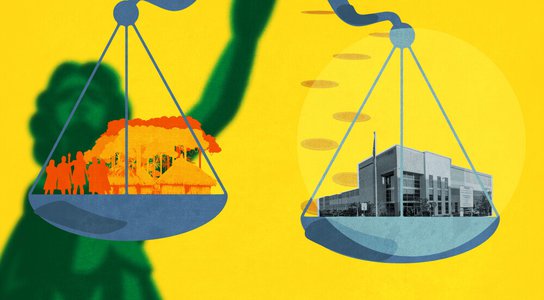Last week, the European Parliament backed a proposal for a new law that could bring us closer to ambitious new human rights and environmental rules for business.
This law would prevent companies from
abusing human rights and wrecking the planet in their pursuit of profit. Time
and again destructive and
polluting companies have wreaked havoc and gotten away with it.
However, the new law aims to finally make it possible for victims of corporate abuse to hold companies accountable for harmful activities.
Members of the European Parliament voted for a version of the new Corporate Sustainability Due Diligence Directive which includes five important wins for people and the planet:
- Preventing and addressing corporate harm - It creates a
duty for companies to do due diligence for their human rights, environmental
and climate impacts. This covers their own business activities as well as those
of their subsidiaries, suppliers and others in their value chain. Due
diligence involves assessing and addressing those impacts, including in situations
where they have not yet occurred. It means that companies
can no longer ignore test results, evidence and warnings from climate
scientists, worker representatives and communities alike. This
can help to change how companies do business and prevent the negative impacts of
business activities, from land grabs and labour abuses to habitat destruction and
climate change.
- Mandatory corporate climate action - By
obliging companies to develop and implement a transition plan that brings it in
line with the 1.5C goal of the Paris Agreement, the Parliament’s position seeks
to catalyse corporate climate action and avert the worst impacts of the climate
crisis. The criteria
established for these transition plans will also help to hold companies
accountable for their action - or inaction. For example, companies would be
required to set time-bound targets, preventing big polluters from continuing to
delay action for decades at a time.
- Legal accountability for companies harming people and
planet – It would
make it possible for companies that have caused or contributed to human rights
abuses and environmental harms to be held liable in European courts. Addressing
some of the barriers that victims face when trying to get justice such as meteoric
legal costs or limited access to key evidence, are potentially transformative
developments. However, further interventions to shift the balance of power away
from companies are needed to ensure that victims have a real chance of holding companies
to account for their actions.
- Engagement with stakeholders – A new
requirement for companies to carry out safe and meaningful engagement as part
of the due diligence duty will be essential for preventing, mitigating and
remedying harmful impacts. Such
engagement must include those who are affected or could be affected by the
business activity and ensure that they are given the relevant information about
actual and potential impacts. Failure to conduct meaningful stakeholder
engagement can exacerbate harms.
- Applies across sectors – The law would apply to large companies that are doing business in the EU across different sectors. This is key since companies across all sectors, from fossil fuels to fashion to finance can have severe impacts on the environment, the climate and a range of human rights. But there’s a catch – the financial sector has pushed back hard on this and is treated a bit differently under this law despite mounds of evidence on the sector bankrolling forest-flattening, climate-wrecking businesses by the billions.
The Parliament’s current proposal has fallen short in some areas but if the final law ends up looking like what was voted on in the Parliament, the EU will be on track to finally reining in corporate abuses to people and planet. Unfortunately, we’re not there yet.
Now the European Commission, national governments (the Council of the EU), and the European Parliament need to negotiate the final text.
These discussions begin this week and we have a long way to go. The Council’s proposal for the law is weak, with no obligations for businesses to act on climate and a free pass for finance to avoid doing environmental and human rights due diligence. Their vision for the law would be an empty box-ticking exercise for polluting businesses.
It’s vital that the EU does not miss a once-in-a-generation opportunity to prevent destructive business practices from fuelling human rights abuses, climate breakdown and environmental damage.
We’ll be following these negotiations closely and advocating for the strongest possible outcome that protects people and planet.


